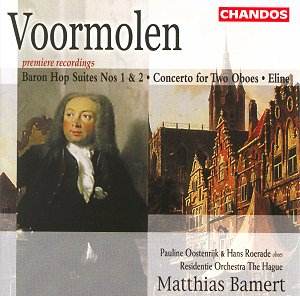Alexander VOORMOLEN (1895 - 1980)
Baron Hop Suite No.1
Concerto for Two Oboes and Orchestra
(with Pauline Oostenrijk and Hans Roerade
oboes)
Eline (Nocturne for Orchestra)
Baron Hop Suite No. 2
 Residentie Orchesta
The Hague - Matthias Bamert
Residentie Orchesta
The Hague - Matthias Bamert
 Recorded in the
Dr Anton Philipzaal 25-28/5/99 Chandos - CHAN 9815 DDD Stereo Playing
time
71.45
Recorded in the
Dr Anton Philipzaal 25-28/5/99 Chandos - CHAN 9815 DDD Stereo Playing
time
71.45
Crotchet

This is another issue by Chandos in their very interesting explorations of
out of the way music conducted by Matthias Bamert. I had not heard of Alexander
Voormolen, nor is he represented in the current catalogue. It is thanks to
Chandos therefore, that we now have the opportunity to hear the music of
this obscure Dutchman, played by a top flight orchestra in really first rate
sound.
I hope that there will be more discs of this kind, as there is a wealth of
wonderful music produced by Holland which we do not get the opportunity to
hear. It is discs like this which allow the adventurous collector to expand
his or her horizons in a very enjoyable way.
What is Voormolen's music like ? On first hearing, the disc was a little
puzzling as the music sounded like a mixture of Rossini, Sullivan, Milhaud
and Satie. I found this quite out of the ordinary, and then, having read
the sleeve note, found that Voormolen had spent many years studying in France
in the early 1920's. He felt a particular sympathy with the music of Roussel,
and was also friendly with Ravel, who was responsible for introducing the
young composer to the publisher Rouart, Lerolle and Co.
The two Baron Hop Suites, written in 1924 and 1931 occupy just over half
of the disc. They are both inventive and highly tuneful works which the orchestra
give the impression of revelling in, aided and abetted by Matthias Bamert's
sure hand, and a superb recording by Chandos. These suites were the result
of an aborted project for an opera comique on eighteenth century The Hague.
They are bright and breezy, and contain "quotations from many Dutch tunes."
Baron Hop was a real person, a famous diplomat and inventor of the Hague
"Hopjes."
As Voormolen said "We (librettist and composer) have attempted to give expression
to our devotion to the House of Orange, our affection for the Residence and
the glorification of Baron Hop in a series of musical pictures." Perhaps
such a parochial subject was bound to be restricted in its general appeal.
Still, the music from this aborted project was well worth preserving, and
here it gets a very worthwhile outing.
The concerto for two oboes is a more serious work, with the central arioso
being quite outstanding. The concerto is expertly played by the two dutch
soloists, Pauline Oosternrijk and Hans Roerade. Both of these artists have
had extensive experience of working with the orchestra in the past, the first
as soloist, and the second as first oboe.
The last work on the disc is a nocturne for orchestra, Eline, which was inspired
by the novel Eline Vere (1889) by Couperus. The novel's atmosphere is mainly
melancholic, full of unfulfilled passions and strained nerves. The work initially
was for piano and orchestra, but here, the piano is absent. There are echoes
of Delius in this piece, and again it is beautifully played and recorded.
The more you hear discs like this, the more you realize just how much music
is out there waiting to be brought to our attention. We are in Chandos's
debt for their courage in recording music such as this and I hope it does
well enough to allow Chandos and Matthias Bamert to explore further issues
of this kind. Why not a two disc set of the symphonies of Hendriyk Andriessen,
which are superb. Apart from a vinyl issue of 1 and 2 from Donemus (many
years ago), plus a recording of No. 4 in the set of Dutch music (Olympia)
nothing much more has been issued.
Reviewer
John Phillips

